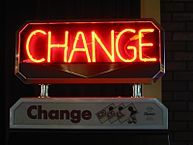Growth Mindset
Believing in Change for More Than Good Grades
It’s time for higher education to think beyond growth mindsets.
Posted April 3, 2017
As prelude to my first post on Psychology Today, I thought it prudent to introduce both myself and my new blog, Nudging Ahead. I’m a social psychologist interested in how we can use simple strategies derived from behavioral science—often referred to as “nudging” (after Thaler and Sunstein’s new-classic book Nudge)—to help people achieve their goals. Specifically, I work with colleges and universities to nudge their students to persist in school and earn their degrees. In Nudging Ahead, I will share with readers of Psychology Today the myriad ways in which behavioral science is being used to reshape higher education, and provide my perspective on where we can go next with these strategies.

Academic Mindsets
To kick things off, I want to talk about lay theories of personality, or our implicit understanding of how people work. The most famous of these are lay theories of intelligence, which were first explored by Dr. Carol Dweck, professor of psychology at Stanford University. Specifically, Dr. Dweck’s work has cast a spotlight on the importance of growth mindsets to academic success. A student with a growth mindset believes that intelligence is malleable and tends to work harder in response to struggle. When learning a new concept doesn’t come naturally, these students think they just haven’t gotten it “yet,” and look for alternative ways to master the material. A student with a fixed mindset, on the other hand, believes that intelligence is inborn and, therefore, tends to give up when challenged. They think to themselves that they’re just not a “math person” or just “bad at writing” and their motivation for that subject wanes. As you can imagine, the former student tends to see their grades improve over time, whereas the latter shows decrements in performance.
From this idea has sprung forth a revolution in how we support struggling students from elementary school all the way through college. For example, a brief web-based growth mindset intervention, delivered to incoming public university students in the summer before college, reduced inequities between advantaged and disadvantaged students in first-year, full-time enrollment by 40 percent. Moreover, this brief, inexpensive, and scalable intervention (what Stanford psychology professor Greg Walton would call a wise intervention) raised fall-to-fall retention among disadvantaged students by 2-3 percentage points. Thus, even amongst 18-year-olds, lay theories of intelligence are important and, more crucially, malleable. It’s findings such as these that have led to an explosion of growth mindset interventions in schools and colleges all across the world.
Lay Theories of Personality
What many educators don’t know, however, is that growth and fixed mindsets are only a subset of our lay theories of personality. Everyone carries around with them beliefs about how people behave under different circumstances, and these are the foundation of how we interact with others. For example, do you believe that people can be altruistic or that they’re ultimately self-serving? When your co-worker offers to help you finish an important report due this week, your response to them will be determined by whether you interpret this as a true act of kindness or an attempt at ingratiation or, worse yet, treachery. But perhaps the most important lay theory that influences the trials and tribulations of our daily lives can be reduced to a simple question: Do you believe that people can change? How you answer that question is very important, because holding the belief that who you are is set in stone has been linked to poorer responses to social adversity, increased stress, worse physical health, and lower academic performance.
A wealth of research led by Dr. David Yeager, assistant professor of psychology at the University of Texas at Austin, has demonstrated that an incremental theory of personality can have a profound impact. Holding the belief that people change across situations and time can produce healthier reactions to adverse experiences. For example, a student with an incremental theory may react in a more pro-social manner toward a bully, understanding that bullies often act aggressively due to their circumstances and that their bullying ways may one day change. Moreover, this student is less likely to internalize their abuse and erroneously conclude that they are a person worthy of being bullied. On the contrary, an entity theory of personality is less adaptive. The bullied student who believes that people are who they are may conclude that nothing about their situation will change, leading to helplessness and despair. Luckily, similar to work in the field of growth mindsets, research has shown that we can intervene to teach students that all people—including themselves—are capable of change.
Lay Theory Interventions
One of the first applications of this idea was an intervention conducted with 230 ninth and 10th graders from a diverse high school in San Francisco. Students were randomly assigned to receive either a six session training in incremental theories of personality, a six session training in coping strategies, or nothing at all. At the end of these sessions, students played a computer game in which they were led to believe that another player was ostracizing them. Naturally, this treatment was upsetting to students, but they were subsequently given the opportunity to take revenge on that player by “forcing” them to eat hot sauce (this was all simulated, of course). Students in the incremental theory intervention assigned nearly 40 percent less hot sauce to “the bully” than their peers. Furthermore, over the course of the school year, teachers reported a greater reduction in conduct problems among these students, and those students were less likely to be tardy or absent from class. This work demonstrated that teaching children about the malleability of people’s personalities could have a significant impact on how students deal with the social and evaluative pressures of high school.
In a briefer version of this intervention, 150 ninth graders in one of the lowest performing schools in California were randomly assigned to receive either incremental theory training or a growth mindset intervention focused on athletic ability. Students who received the 25-minute incremental training reported less stress and better physical health eight months after this brief exercise. Moreover, students in the incremental theory intervention who came into ninth grade with the belief that people don’t change showed a marked improvement in grades even though the intervention had nothing to do with academics. In a follow-up study, 303 ninth graders in Rochester, New York, who received incremental theory training were less stressed over the next nine days, as evidenced by both self-reports and lower levels of salivary cortisol, a biological marker for stress. Furthermore, these students had higher GPAs in their core courses at the end of their fall and spring semesters. Again, this wise intervention that came during a major transition point for students—starting high school—had profound effects on both health and academic outcomes despite not directly addressing either of those areas.
Applications in Higher Education
Teaching college students to embrace the idea that people can and do change has the potential for wide-ranging, significant impacts in higher education. Although these interventions need to be adapted for and replicated with college samples, they do suggest that it may be valuable for institutions to adopt the broader view that students’ mindsets affect more than just their educational outcomes. Taking a step beyond growth mindsets, changing college students’ lay theories of personality could help them reduce stress, improve health, temper aggression, manage social relationships, and enhance academic performance. Considering that more college students are seeking help for anxiety and depression than ever before, brief interventions that could help allay both academic and emotional challenges would be particularly beneficial.
Given evidence that these types of interventions may be most efficacious during major life transitions, fostering incremental theories as part of an orientation program, or even starting closer to when students are accepted to college, would be advised. Moreover, employing this wise intervention approach as early as possible could create a snowball effect, with more positive freshman-year experiences (both academically and socially) reinforcing this incremental mindset and continually bolstering students’ overall well-being. This type of intervention would be scalable and applicable to many different populations, and offers great promise for substantially improving outcomes for college students nationwide.
References
Dweck, C. S. (2008). Mindset: The new psychology of success. Random House Digital, Inc.
Thaler, R. H., & Sunstein, C. R. (2008). Nudge: Improving decisions about health, wealth, and happiness. Penguin Books.
Walton, G. M. (2014). The new science of wise psychological interventions. Psychological Science, 23(1), 73-82.
Yeager, D. S., Johnson, R., Spitzer, B. J., Trzesniewski, K. H., Powers, J., & Dweck, C. S. (2014). The far-reaching effects of believing people can change: Implicit theories of personality shape stress, health, and achievement during adolescence. Journal of Personality and Social Psychology, 106(6), 867-884.
Yeager, D. S., Lee, H. Y., & Jamieson, J. P. (2016). How to improve adolescent stress responses: Insights from integrating implicit theories of personality and biopsychosocial models. Psychological Science, 27(8), 1078-1091.
Yeager, D. S., Trzesniewski, K. H., & Dweck, C. S. (2013). An implicit theories of personality intervention reduces adolescent aggression in response to victimization and exclusion. Child Development, 84(3), 970-988.
Yeager, D. S., Walton, G. M., Brady, S. T., Akcinar, E. N., Paunesku, D….Dweck, C. S. (2016). Teaching a lay theory before college narrows achievement gaps at scale. Proceedings of the National Academy of Sciences, 113(24), E3341-E3348.


